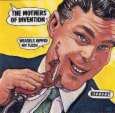 Too many synth artists of the early to mid-'70s seemed more interested in demonstrating their dexterity with their instrument than actually showing why it was worth being dexterous with in the first place. The reason Tim Blake is important is because he took the opposite approach entirely. Schooled in Gong and soon to dignify Hawkwind, Blake is a composer first, a technician a very distant second. And if New Jerusalem, his solo debut, represents a peak which electronic rock in general has yet to top, Crystal Machine is at least equal to the task. In maintaining the earlier album's application of melody over mood, Blake totally separates himself from the ranks of sallow, clever souls who let their machines do all the talking -- a lesson which, by year's end, both Jean Michel Jarre and Donna Summer's "I Feel Love" would both have translated into worldwide chart-toppers. More importantly, however, Blake also liberated the synth from the showroom and showman. Two tracks -- "Last Ride of the Boogie Child" and "Synthese Intemporel" -- were drawn from live concerts, an arena where very few onlookers are listening in on headphones and even fewer care how clever the musician is. The fact that flying bottles, cans, or coins interrupts neither performance testifies to that. There is nothing here which packs the sheer visceral energy of "New Jerusalem" itself, of course, but that's a point which Blake himself confirms, by confining the title track this time to a scant minute or two of oscillation, then slipping it nicely into a stick groove at the end of the vinyl. If listeners let their attention wander for a moment, it could play on forever. AMG.
Too many synth artists of the early to mid-'70s seemed more interested in demonstrating their dexterity with their instrument than actually showing why it was worth being dexterous with in the first place. The reason Tim Blake is important is because he took the opposite approach entirely. Schooled in Gong and soon to dignify Hawkwind, Blake is a composer first, a technician a very distant second. And if New Jerusalem, his solo debut, represents a peak which electronic rock in general has yet to top, Crystal Machine is at least equal to the task. In maintaining the earlier album's application of melody over mood, Blake totally separates himself from the ranks of sallow, clever souls who let their machines do all the talking -- a lesson which, by year's end, both Jean Michel Jarre and Donna Summer's "I Feel Love" would both have translated into worldwide chart-toppers. More importantly, however, Blake also liberated the synth from the showroom and showman. Two tracks -- "Last Ride of the Boogie Child" and "Synthese Intemporel" -- were drawn from live concerts, an arena where very few onlookers are listening in on headphones and even fewer care how clever the musician is. The fact that flying bottles, cans, or coins interrupts neither performance testifies to that. There is nothing here which packs the sheer visceral energy of "New Jerusalem" itself, of course, but that's a point which Blake himself confirms, by confining the title track this time to a scant minute or two of oscillation, then slipping it nicely into a stick groove at the end of the vinyl. If listeners let their attention wander for a moment, it could play on forever. AMG.listen here
FR

Hello,
ResponderEliminarMany, many thanks for all the marvelous music found on this musical blog!
Greetings from Nenest
Holy crap!!!! Thank You!!!!!!!!!!
ResponderEliminar